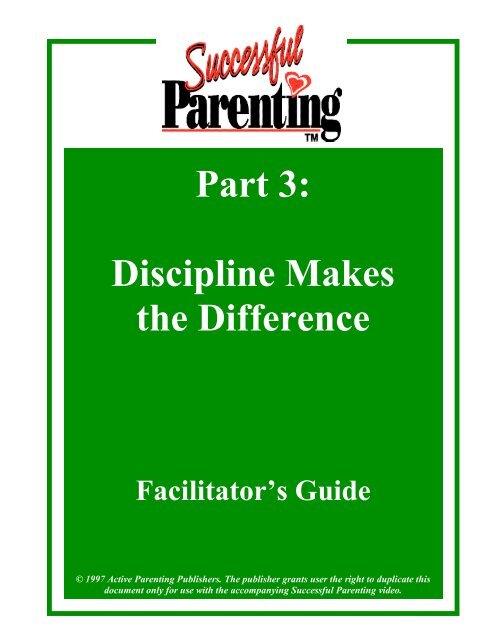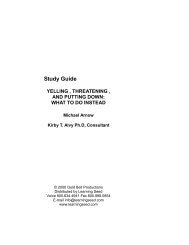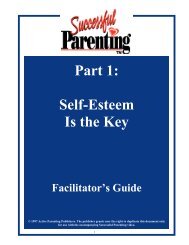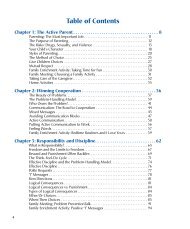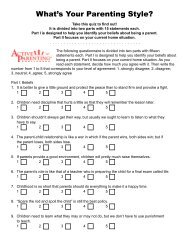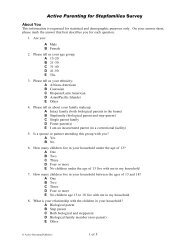Facilitator's Guide (download) - Active Parenting Publishers
Facilitator's Guide (download) - Active Parenting Publishers
Facilitator's Guide (download) - Active Parenting Publishers
Create successful ePaper yourself
Turn your PDF publications into a flip-book with our unique Google optimized e-Paper software.
Part 3:<br />
Discipline Makes<br />
the Difference<br />
Facilitator’s <strong>Guide</strong><br />
© 1997 <strong>Active</strong> <strong>Parenting</strong> <strong>Publishers</strong>. The publisher grants user the right to duplicate this<br />
document only for use with the accompanying Successful <strong>Parenting</strong> video.
Hi!<br />
As a teacher and school counselor for the past 20 years, I have worked with children,<br />
their teachers, and their parents or guardians. I am convinced that children want to<br />
succeed and that parents and guardians try to do a good job of raising their children.<br />
I believe that parenting is the toughest job there is, and yet, it is the one for which we<br />
get very little training. I want to change that.<br />
My partner, Robin Richards, and I are producing a series of videotapes called<br />
SUCCESSFUL PARENTING. In addition to this one, Part One, "Self-Esteem is the<br />
Key" and Part Two, "Communication is Crucial" are also available.<br />
We are delighted that you have selected our materials to use in your workshop. It is<br />
our fervent hope that you and those attending your workshop will view this video,<br />
enjoy it, discuss it, learn from it, apply what you have learned, and then tell others<br />
about it. We hope that all of the children affected by this workshop can thus be<br />
happier and have fewer problems both now and in the future. We hope the materials<br />
in this series will help you and your workshop participants become even more<br />
successful at the art of parenting.<br />
Best wishes!<br />
Barbara Lynn Taylor<br />
2
Notes to facilitators:<br />
Please feel free to use your own words, to tailor the discussion to the particular group<br />
you're working with, and to put lots of YOU into it. That's what will make your<br />
workshop special!<br />
• "Stage " directions and suggestions for your benefit will be<br />
shown in this type style.<br />
• Things for you to say or paraphrase will be in this type style.<br />
• Information will appear in this type style.<br />
Materials required to conduct a workshop:<br />
1. Videotape-"Discipline Makes the Difference".<br />
(This is copyrighted and may not be duplicated.)<br />
2. A copy of each handout found on pages 26 & 27 in this <strong>Facilitator's</strong> <strong>Guide</strong><br />
for each participant. (You're welcome to duplicate these.)<br />
3. A pencil for each participant.<br />
4. This <strong>Facilitator's</strong> <strong>Guide</strong>.<br />
5. A parent kit is suggested for each participant for follow-up.<br />
See ordering information at the end of this guide.<br />
Allow sufficient time to receive your order.<br />
6. Gold stars are optional, see Conclusion.<br />
7. A board and chalk or flip chart and markers.<br />
8. A blank sheet of paper for each participant for use with page 18.<br />
3
Suggested time frame for a one-hour workshop:<br />
• Do Part I, "Before Viewing the Video"<br />
• Distribute the two handouts and urge participants to record<br />
• their thoughts as the workshop progresses.<br />
• Show the video, "Discipline Makes the Difference"<br />
• Discuss the suggestions. You may choose to do:<br />
The 10 suggestions for about 3 minutes each.<br />
5 of them for 6 minutes each.<br />
3 of them for 10 minutes each.<br />
2 of them for 15 minutes each.<br />
1 for the entire 30 minutes.<br />
…or, whatever works for you!<br />
• Summarize, go over "My Personal Plan", set personal goals,<br />
and make commitments.<br />
5 minutes<br />
2 minutes<br />
19 minutes<br />
30 minutes<br />
4 minutes<br />
Suggested time frame for a two-hour workshop:<br />
• Do Part I, "Before Viewing the Video"<br />
• Distribute the two handouts and urge participants to record<br />
• their thoughts as the workshop progresses<br />
• Show the video, "Discipline Makes the Difference"<br />
• Discuss the suggestions. You may choose to do:<br />
The 10 suggestions for 8 minutes each<br />
5 of them for 16 minutes each.<br />
2 of them for 40 minutes each<br />
…or whatever works for you!<br />
10 minutes<br />
2 minutes<br />
19 minutes<br />
80 minutes<br />
• Summarize, go over "My Personal Plan", set personal goals,<br />
and make commitments.<br />
9 minutes<br />
4
SUGGESTIONS FOR THE FACILITATOR:<br />
Welcome each of your workshop participants individually, if possible. Try to find out<br />
their names and something about why they came to the workshop. You may want to<br />
survey the group either one-at-a-time or after they gather as to the ages, sexes, and<br />
names of their children. That will help you personalize your comments later as you<br />
lead the discussions.<br />
It is important that you know your audience and that you try to be sensitive to their<br />
levels of comprehension with respect to both concepts and vocabulary. Strive to teach<br />
to those levels.<br />
Set a tone of respect by saying something like, "Before we begin, let's all agree on<br />
confidentiality in this group. For each of us to feel safe in expressing our thoughts and<br />
feelings today (tonight), we need to be assured that nothing will be repeated outside<br />
this group. Ok? "<br />
The intention of the next section called "Before Viewing the Video" is to stimulate<br />
interest and to encourage the viewers to watch with a purpose.<br />
NOTES:<br />
5
I. BEFORE VIEWING THE VIDEO.<br />
What, to you, is the hardest thing about being a parent?<br />
Possible answers: Getting them to behave, fear about drugs, sex, the law, etc.,<br />
worrying about how they'll be when they grow up, being tired all the time, paying for<br />
everything, feeling upset so much because of the lack of cooperation, appreciation,<br />
and all the arguments, etc.<br />
So, if your children would behave the way you want them to, would you find life<br />
happier and easier? Possible answers: Yes, absolutely, sure would, you bet!<br />
How many of you have had days when you felt as if it were hopeless and you<br />
were ready to give up? Please (or, if you'd like a lighter tone, "Oh, come on")<br />
raise your hands. Chances are everyone, except the very shy participants, will raise<br />
his or her hand. This would be a good place for some group cohesion building. Laugh,<br />
link their responses, and try to get a feeling going of, "We're all in this together".<br />
What are some reasons parents want kids to behave appropriately?<br />
Answers will vary.<br />
Why should parents be in charge? Answers will vary.<br />
What different methods of discipline have you already used? Answers will vary.<br />
Because all families are different, each parent and each child is different,<br />
situations change, and children grow up, parents need to understand and be<br />
ready to use a variety of different discipline techniques.<br />
Do you think parents ever handle situations with their children poorly? Do you<br />
think parents could do a better job of disciplining? (Pause)<br />
Of course they could. We all could. None of us will ever be perfect parents but we<br />
can all improve. This video will give you many suggestions on ways to discipline<br />
your children.<br />
You have taken a very positive step toward being a more successful parent by<br />
coming to this workshop. GOOD FOR YOU!!!<br />
6
Distribute one copy of "My Personal Plan " to each participant. Explain that they will<br />
write down ideas as they view the video and during the discussions. Explain that the<br />
left hand column is for those things they already do well (and make sure they do write<br />
those things down!) and the right column is for the things they want to try with their<br />
family. Assure them that the worksheet can be for their eyes only.<br />
As you view the video, remember nobody does it all right. Pat yourself on the<br />
back for those things you consistently do well. If you hear a suggestion and you<br />
realize that this is an area you haven't worked on, make a personal commitment<br />
to try. You'll be helping your children, and you'll feel better about yourself as a<br />
parent because you'll be sure you're on the right track.<br />
Distribute a copy of the ten suggestions to each participant. Tell them you're giving<br />
them a list of the ten suggestions in the video so that they won't have to try to write<br />
them all down while the video is showing. It is for them to keep.<br />
We have placed one second of black screen between the sections of this videotape so<br />
that you may stop it at various points and therefore give you some choices in how you<br />
structure your workshop. Do what feels right to you<br />
Here are some possibilities:<br />
1. Play all nineteen minutes at one time, then lead the<br />
discussion.<br />
2. Play the first three minutes, stop the tape, discuss that<br />
part, then play the remaining sixteen minutes in which<br />
the ten suggestions for doing discipline are explained.<br />
Then discuss those suggestions.<br />
3. Play the first part, stop, discuss, then play the<br />
suggestions, stopping and discussing one at a time.<br />
So now, please relax and enjoy, "Discipline Makes the Difference".<br />
While the video is showing, try to unobtrusively observe each workshop participant.<br />
Notice any signs of discomfort, identification, agreement, disagreement, humor, etc.<br />
This will be useful as you lead the ensuing discussions.<br />
7
II. AFTER VIEWING THE VIDEO<br />
Use this section of the <strong>Facilitator's</strong> <strong>Guide</strong> as a reference as you lead your discussion.<br />
Remind your participants that, for them to get the most out of this workshop, they must<br />
be honest with themselves. Encourage them to be open in the discussion and to<br />
participate in the activities.<br />
Be sure to listen attentively and be sensitive to their comments. Encourage your<br />
participants to communicate with each other. Be aware that some of the statements<br />
made in the video will elicit disagreement. That's fine. That should lead to lively,<br />
informative, meaningful discussions!<br />
8
FROM THE FIRST THREE MINUTES<br />
OF THE VIDEO<br />
1. The video showed several parents who have just plain "Had it!". Have you<br />
ever felt the way they did? What happened to get you to that point? Was it a lot<br />
of "little stuff" or something "big" like drugs or sex? Answers will vary.<br />
2. The video indicated that there are two reasons parents want kids to behave<br />
appropriately. What are they? Answers: So life will be peaceful now and so children<br />
will grow up to be happy, successful adults. Can you think of any other reasons?<br />
Answers will vary.<br />
3. What happens when children are allowed to run the house?<br />
Possible answers: Parents are upset, poor choices are made, the routine turns to chaos,<br />
and children have an unsettled feeling that parents don't care about them, etc.<br />
4. What do you think about the idea that children actually want you to put<br />
limits on them? Answers will vary.<br />
5. How many of you are single parents? Pause for response. What is it like for<br />
you? What are the tough parts? Are there any advantages? Answers will vary.<br />
6. How many of you are in a home with both parents? Pause for response. What<br />
is it like for you? What are the tough parts? Are there any advantages? Answers<br />
will vary.<br />
7. Consider this statement from the video: "We believe the foundation for all<br />
discipline is LOVE." What does that mean to you? Answers will vary.<br />
8. What does your child's self-esteem have to do with discipline? Possible<br />
answers: When children feel good about who they are, they're happier and easier to be<br />
with, if you are always trying to improve your child's self-esteem, you'll be a better<br />
and nicer parent, the kinds of things you do to improve your child's self-esteem will<br />
also improve your relationship with that child, then they'll be easier to teach, etc.<br />
9. Can you remember four ideas the first part of the video had for enhancing<br />
your child's self-esteem? Answers: Skillfully listening to your children, celebrating<br />
their successes, encouraging their talents, and spending as much positive time as<br />
possible with your children.<br />
9
FROM THE LAST SIXTEEN MINUTES<br />
OF THE VIDEO<br />
If you decided to start and stop the tape, your discussion will be segmented. The<br />
following directions assume you showed it straight through. Please make the<br />
appropriate adjustments.<br />
The second part of the video consists of 10 suggestions. Now we are going to<br />
discuss (some or all of) those suggestions. Remember to continue taking notes on<br />
your worksheet.<br />
Discuss any or all of these suggestions in any order you wish. You may want to take<br />
them in numerical order. You may want to let the participants choose which ones they<br />
want to discuss, or you may want to recall the participants' reactions and choose<br />
according to those reactions.<br />
10
1. TRY NOT TO…<br />
A. Examples<br />
1. Do you remember your own parent yelling directions at you?<br />
Is anyone willing to admit that they bark instructions at their<br />
own kids like the mother in the hall or the father in the chair?<br />
Answers will vary.<br />
What effect does that have? Is it good teaching?<br />
Possible answers: Makes kids mad, makes kids feel like pets,<br />
teaches that parents can order kids around showing no respect.<br />
Is it good for your relationship with your child? Answer: No.<br />
2. Do you think children deserve privacy? Do you think parents<br />
ever barge in their children's rooms without knocking like the<br />
man in the video? Should kids knock at their parent's door?<br />
Should parents knock at their kids' doors? If so, how old<br />
should your child be when that starts? Answers will vary.<br />
B. Initiate a discussion based on the comments by Dr. Drew<br />
Edwards regarding the importance of understanding the reasons<br />
for a child's misbehavior.<br />
2. ESTABLISH CLEAR<br />
EXPECTATIONS.<br />
A. Concept: This is a quick, but extremely important, section. One of<br />
the most important parts of successful discipline is successful<br />
communication. Often, it's the parent who causes a problem<br />
because the rules, requests, and expectations are not made<br />
perfectly clear. Granted, there are times when your kids will try<br />
to weasel out of trouble by claiming that you never told them<br />
something. Be sure there's no way they can claim this.<br />
B. Who can think of some real examples of either:<br />
1. When their child tried to get out of being in trouble<br />
by claiming he or she was never told something.<br />
2. A time when the parent really did not explain well<br />
and that caused the problem?<br />
Please share with the group. Answers will vary.<br />
11
3. NATURAL CONSEQUENCES<br />
A. Concept: One very effective method of discipline is to allow natural<br />
consequences to occur. That means letting the child experience the result of his<br />
or her behavior. Sometimes it's pretty easy for a parent to do and sometimes it's<br />
very difficult. Ever since their infancy, we've been there to pave the way and to<br />
protect our children. It's uncomfortable for us to see our children struggle. So,<br />
we often rescue them. We want to make our children's lives easier than ours have<br />
been. But when we do that, we often take away the very spark that allowed us to<br />
meet our challenges. Let's be strong.<br />
B. Examples<br />
1. Did the example of the boy who forgot his homework<br />
paper sound familiar? When, if ever, do you think<br />
parents should take books, papers, lunches,<br />
permission slips, gym shorts, money, etc. to school<br />
when children forget them? Could that cause a<br />
problem for some parents? Answers will vary.<br />
2. What did you think about the skit where the teenage<br />
boy comes in late for dinner after playing basketball?<br />
Which example sounds more like you? Which one<br />
sounds like your child's other parent? This would be a<br />
good place for a role play. Pick one (if you'll play the<br />
other part) or two participants to show how they<br />
might handle the same situation. You may need to<br />
do it a couple of times to get them relaxed.<br />
Try to encourage some humor here. Enjoy!<br />
12
3. Now let's brainstorm some other situations where the use of natural<br />
consequences would be appropriate.<br />
You may want to write the ideas of the group on your<br />
board or flip chart. Be careful how you handle it if<br />
an answer is not on target. Be gentle! If your group<br />
is reluctant to share even after a sufficient amount of<br />
wait time, here are some possibilities for you to suggest:<br />
a.) Child leaves dirty uniform on floor and misses<br />
laundry being done. Consequence:<br />
Child either doesn't play in the next game or wears<br />
a dirty uniform.<br />
b.) Eighteen year old allows the car to run<br />
out of gas. Consequence: Finds his/her<br />
own way home. (Discuss danger factor.<br />
Good time to discuss other dangerous<br />
natural consequences.)<br />
c.) Preschool/school age child angrily throws toy<br />
down and says, "1 don't want this stupid thing<br />
anymore." Consequence: Toy is taken away.<br />
d) Elementary/Middle age child plays outside all<br />
afternoon and then doesn't have time to do<br />
homework before bedtime. Consequence:<br />
Child goes to bed on time and then goes to<br />
school without homework and faces the<br />
consequences from the teacher (such as a<br />
zero, stay after school, double homework,<br />
or whatever).<br />
e) If your child has a drug problem, are natural<br />
consequences appropriate?<br />
Discuss the suggestions in terms of whether it's a<br />
common problem, whether the natural consequence<br />
makes sense, and whether the parents can<br />
realistically see themselves doing it.<br />
13
4. LOGICAL CONSEQUENCES<br />
A. Concept: Logical consequences happen when parents<br />
decide on a certain action that specifically fits what the<br />
child did (or might do) that's wrong. Logical consequences<br />
don't just happen naturally; the parents impose them<br />
purposely because they believe it will teach a lesson<br />
effectively. It's best if parents explain what will happen<br />
ahead of time, although sometimes that isn't practical.<br />
B. Examples<br />
1. If your child breaks or destroys something, the logical consequence is<br />
that he or she is responsible for cleaning up and fixing it or replacing it if<br />
hat is possible. That might involve some time or it might require money. If<br />
he child has a bank account, or gets an allowance, or if you allow your<br />
child to earn money doing chores, you would want your child to pay you<br />
the value you assigned to the item. It would be even more meaningful it the<br />
child could actually go to the store and purchase the replacement. That<br />
does take time and energy on your part, but, remember, discipline is<br />
teaching, and it's not easy!<br />
This would be a good place to do some brainstorming. You may -want to<br />
have the group help you list examples of items their kids could break, or<br />
have broken, that could be fixed or replaced. You may want to write these on<br />
our board or flip chart.<br />
14
2. What did you think about the little boy eating cookies and his mother<br />
saying, "Since you've already eaten your cookies, you won't have any for<br />
dessert tonight"?<br />
Answers will vary.<br />
3. What are some logical consequences to use when children<br />
come in late? Possible answers: Ground them for some<br />
length of time, don't allow them to go to the same place again for<br />
some length of time, make them come in proportionately earlier<br />
the next time, etc. What did you think about the way the<br />
father greeted the girl at the door? What did you think<br />
about what he said and the way he said it?<br />
Possible answers: Father very angry, father not angry enough, father too strict,<br />
father not strict enough, etc. What effect does the way the consequences are<br />
announced have on their effectiveness? Answers will vary.<br />
4. Can you think of ways to apply the use of logical<br />
consequences if you suspect your child has a drug<br />
problem? Answers will vary. NOTE: This guide is<br />
not intended to offer in-depth solutions to drug<br />
problems. If participants seem to have difficulties in<br />
this area, you may want to refer them to a substance<br />
abuse hotline, mental health professional, or other<br />
resources in your community.<br />
5. Can you think of other examples of when your kids have<br />
misbehaved for which logical consequences would be a<br />
good teaching tool? Answers will vary.<br />
15
5. BEHAVIOR MODIFICATION<br />
A. Concept: It is based on the idea that if people act in a certain<br />
way, and then very soon after that they get something they like, they'll act<br />
that way more often. So, if we want children to behave in a certain way, we<br />
make sure they get something that pleases them when they do it right.<br />
B. Examples (You may want to start a list on your board or<br />
chart headed "Things Children Will Work For". Add ideas<br />
from this section.)<br />
1. Who can remember the example where all the parent<br />
did was tell or thank the child for doing something?<br />
Answer: The boy was clearing the table. Can something that simple really<br />
work? Answers will vary.<br />
2. Do you remember when the father hugged the little girl?<br />
The girl liked that. Children also like kisses, smiles, pats on the back,<br />
high fives, and other expressions of affection. As kids get older, they<br />
might show less enthusiasm for displays of affection from you. Every<br />
child is different. Teens and preteens may not like it in public, but most<br />
are surprisingly receptive in private.<br />
3. Can you think of some privileges that children enjoy that<br />
don't cost us money? Possible answers: Let them stay up later, eat special<br />
food, have a friend over to play, have a friend over to spend the night, read a<br />
story to them, watch a TV show, etc.<br />
4. What items do your kids want you to buy them? What are<br />
popular items that cost under $5.00? Answers will vary. What are the<br />
most popular items that cost more than $5.00? Answers will vary.<br />
5. What is the oldest child with whom you'd use<br />
behavior modification? For what issues? Would it work for messy<br />
rooms? Breaking curfew? School issues? Speeding tickets? Sex issues?<br />
Drug issues? How would you do it? Answers will vary.<br />
16
C. Initiate a discussion regarding spanking. Try to be open.<br />
Keep in mind that your participants will have many different<br />
points of view and many different experiences in their own<br />
lives. Show respect for the opinions of each person in your<br />
group. Ask questions about the statements made by<br />
Dr. Williams with reference to:<br />
1. self-esteem in children<br />
2. children internalizing that they're bad<br />
3. spanking making them angry<br />
4. taking their anger out on others, i.e. aggression<br />
5. "Children do more of what you do than what you say."<br />
6. modeling the behavior of hitting<br />
D. Barbara Lynn mentioned a number of risks we take when we<br />
rely on spanking as our main method of discipline.<br />
Refer to the following notes & get a good discussion going.<br />
1. Will probably not accomplish what you want.<br />
a.) When you're not looking, they'll do it again.<br />
b.) Not teaching self-control.<br />
c.) May be teaching your children to hurt others.<br />
d.) You may even abuse your children.<br />
e.) Your children may:<br />
-1- think you're not fair<br />
-2- fight with you<br />
-3- be out to get you<br />
-4- sneak around you<br />
-5- have low self-esteem<br />
2. What do you think about this statement?<br />
"Why take those risks when there are so many safe and<br />
effective ways to discipline?"<br />
17
6. THINGS TO SAY TO YOUR CHILD<br />
ABOUT TIME OUT<br />
A. Who has had some experiences with time out? What<br />
happened? Answers will vary.<br />
B. You might review the suggestions presented in the video:<br />
1. I will take you to the time-out place.<br />
2. You will sit down in the chair.<br />
3. As soon as you get quiet, I'll start the timer.<br />
4. If you make noise, I'll start the timer again.<br />
5. If you get up, I'll start the timer again.<br />
6. When the timer rings, I'll come. I'll let you out.<br />
7. If you're not yet in control, I'll send you to the bedroom until<br />
you're calm enough to come out.<br />
NOTE: When he or she has already "served the time" for the original<br />
wrongdoing, rather than to continue the time out, the idea is to teach the child that<br />
people need to be in control before rejoining "society". So, suggest that he or she go<br />
to a private place (a bedroom is one possibility) until he or she can "get it together".<br />
You may choose to let him or her decide when to come out or you may choose to be<br />
the judge that he or she is ready.<br />
Another way to use behavior modification is to use charts to keep<br />
track of everyday expectations. You may want to provide your<br />
participants with copies of the samples at the end of this book so they<br />
can make some to fit their individual needs. How many of you have<br />
ever used charts to keep track of the things your children are<br />
doing? Did it work? How did you do it? Answers will vary. The<br />
video indicated that charts like this can work with children of all<br />
ages. Of course, you should modify the expectations and the<br />
appearance for older children. Please see the typed chart at the<br />
back of this book for an example of one that could be used with<br />
older children. One could even be further adapted for older teens<br />
and adults.<br />
18
7. IMPROVING A SPECIFIC BEHAVIOR<br />
A. Remember, behavior modification will work if you're willing to<br />
put in the time, energy, and consistent effort. Let's review the<br />
steps. Remind the participants that it is important to work on<br />
only one problem at a time. Here are the items on the list of<br />
how to improve a specific behavior. You may want to list them<br />
on your board or flip chart or you may have written them ahead<br />
of time.<br />
B. Describe and discuss each one.<br />
1. Target the problem.<br />
2. How many times is the child doing it now?<br />
3. Decide on the time interval.<br />
4. Conference with your child.<br />
5. Decide together on what the child will get and how<br />
many it will take to get it.<br />
6. You decide on a negative consequence.<br />
C. Ask the group to tell you some of the problems they're having<br />
with their children. If you get a general complaint such as,<br />
"He's doing bad at school" or "She bothers her sister", help<br />
the participants make it more specific. List them on your<br />
board or flip chart.<br />
D. Now take the list you just generated and select a couple of<br />
examples to discuss in detail, using the procedure outlined<br />
above.<br />
E. You may want to give each participant a blank sheet<br />
of paper and guide them through creating a chart<br />
to use with their own child regarding a specific problem they're having.<br />
19
8. SETTING UP A CONTRACT<br />
A. Another discipline technique is to use contracts. They are<br />
agreements between the parent and the child to help the<br />
child learn to do something better.<br />
B. It is very important that the parent keeps his or her end of<br />
the bargain because it is also a lesson in commitment.<br />
9. FAMILY MEETINGS<br />
A. Concept: This is an effective option for solving problems that<br />
affect all members of the family. Have any of you ever tried having a<br />
family meeting? How did you do it? Was it helpful?<br />
Answers will vary.<br />
B. Suggestion-Most people agree that until children are at least<br />
eight years old, they aren't fully able to participate. Individual<br />
cases may differ.<br />
10. TEMPER TANTRUMS<br />
A. Causes:<br />
1. hunger<br />
2. fatigue<br />
3. change in schedule<br />
4. emotional overload<br />
5. inability to express frustration verbally<br />
B. Suggestions<br />
1. try to prevent them by doing things when children are at<br />
their best.<br />
2. make sure your child is safe<br />
3. let it run its course<br />
4. behave calmly and in a matter-of-fact manner<br />
5. remember that all other parents have been through this<br />
before, so try not to be embarrassed<br />
20
<strong>Parenting</strong> Styles: Dr. Drew Edwards<br />
Dr. Edwards described three types of parenting styles. What were they?<br />
Answers:<br />
1. One is where the parent is strict, tells the children what to<br />
do and what not to do, and doesn't focus on the child's<br />
feelings or opinions.<br />
2. Another is where the parent focuses on feelings and<br />
opinions, doesn't give a whole lot of guidance and<br />
direction and may not emphasize responsibility.<br />
3. Authoritative-This one is strict when it needs to be,<br />
requires responsibility and gives direction, gives a lot of<br />
support and nurturance and gives a lot of respect for the<br />
child's feelings.<br />
What are the benefits for the child of each style? What are the benefits for the<br />
parent of each style?<br />
What kind of adult is a parent creating by the use of each style?<br />
Possible answers:<br />
A parent who follows #1 may love the child very much but isn't allowing the child to<br />
think for him or herself. One risk is that those children will become followers and may<br />
follow people who do not have their best interests at heart. Solicit other answers.<br />
The parent who follows #2 may have children who are irresponsible and who are so<br />
used to having their own way that they become very frustrated when they encounter<br />
situations where they can not have their own way. Solicit other answers.<br />
How would you characterize a child who has a parent who follows #3?<br />
Do you see yourself in any of these styles? Do you now think you should be using<br />
a different style? Why? What might keep you from doing it? Answers will vary.<br />
21
OPEN-ENDED SITUATIONS<br />
The following are three situations that commonly occur in families. Watch each<br />
segment and then discuss it and/or role play it with your group. Encourage the<br />
participants to share what they might have done before seeing this video and then<br />
what they might try now. Emphasize that there are no right or wrong answers and that<br />
many solutions might work.<br />
1. In this scene, a grandfather is trying to get his grandson to get ready for bed.<br />
The grandson is ignoring and stalling. The grandfather has asked repeatedly.<br />
What could he do next? Possible answers:<br />
a. Natural Consequences Leave him to get himself to bed, realizing that he may<br />
not have his things ready for school, which will have consequences of its own, and<br />
realizing that he may not get enough sleep and will therefore be tired the next day. See<br />
if your group can come up with others.<br />
b. Logical Consequences If he goes to bed late tonight, he'll have to go to bed<br />
that much earlier tomorrow. If he doesn't get in bed on time, he loses either the<br />
privilege of reading to himself or of having a book read to him. See if your group can<br />
come up with others.<br />
c. Behavior Modification Start a chart. For each night that he gets to bed on<br />
time, he earns a check or star or sticker. For a certain number of stickers, he gets<br />
something he wants. Another use of behavior modification could be promising to read<br />
from a favorite book if and only if he is in bed at the appointed time. See if your group<br />
can come up with others.<br />
d. Contract Write up a contract agreeing to offer something he wants if he will<br />
get to bed on time without your having to remind him a certain number of times.<br />
Write it up, both of you sign it, and shake on it.<br />
See if your group can come up with others.<br />
22
2. In this situation, the mother comes in her daughter's room to find it messy. The<br />
daughter argues with her about cleaning it up. What could the mother do?<br />
a. Natural Consequences Let her leave her room messy. Before long, she won't<br />
be able to find clothes, schoolwork, and other things that she needs, or perhaps she'll<br />
be embarrassed when someone comes in. She might trip over something and get hurt,<br />
or she might break something of value to her. See if your group can come up with<br />
other ideas.<br />
b. Logical Consequences You could decide to confiscate everything that is out<br />
of place. She could lose them permanently or for some specified length of time. She<br />
might have to buy them back. Another technique would be to make going somewhere<br />
that she wants to go contingent on a neat room. See if your group can come up –with<br />
other ideas.<br />
c. Behavior Modification You could tell her you plan to check her room once or<br />
perhaps twice a day. If it is neat enough to meet your criteria, she will get a check or<br />
star on a chart. When she earns an agreed-upon number of checks or stars, she'll get<br />
something she wants. Another possibility is to give her a bowl full of something like<br />
marbles or pennies. Place a certain value such as a nickel, a dime, or a penny on each<br />
item. Tell her that at various unannounced times during the week, you'll check to see<br />
how her room looks. For each item you find out of place, you'll remove a marble or<br />
penny. At the end of the week, she can trade in what's left for something she wants.<br />
See if your group can come up with some other ideas.<br />
d. Contracts Make an agreement with the child that when she keeps her room<br />
neat to specified standards that you'll do something for her or with her or you'll get her<br />
something that she wants. Remember, that might be something you frankly would<br />
have given anyway, only now it's contingent on her behavior. See if your group can<br />
come up with others.<br />
23
3. In this situation, the teacher is telling the mother that she is having lots of<br />
trouble with John. He's forgetting his homework, he doesn't finish his classwork,<br />
he's daydreaming, he's talking to his neighbors, and yesterday he got into a fight<br />
on the playground.<br />
a. Natural Consequences The mother could encourage him to do better, but if he<br />
doesn't, just let him face the results. That could include failing his grade or being<br />
suspended or even excluded for fighting. Is that being a responsible parent? Could you<br />
do that if the child was 9? What if he's 17? Does your group have any other ideas in<br />
this category?<br />
b. Logical Consequences If he forgets his homework or doesn't complete his<br />
classwork, he could be required to stay in his room and do all of it over again before<br />
he could go out with his friends. Regarding the fight, he could be required to write a<br />
letter to the other child or write an essay about fighting for the parent. Since he is<br />
having trouble getting along with others, he could be grounded for some length of<br />
time. Does anyone have any other ideas here?<br />
c. Behavior Modification Work out a chart that lists the areas that are giving the<br />
child trouble. In cooperation with the teacher, keep track of how he's doing each day.<br />
At the end of the week, count up the checks (or stars, or stickers) and give him the<br />
agreed-upon things if he earned enough. You may want to do this on a daily basis if<br />
the problem is severe or if the child is young. See if your participants can think of<br />
some more ways to apply behavior modification.<br />
d. Contracts Write up an agreement between you and the child explaining what<br />
you will do and what he will do. Both of you sign it and shake. Keep track of how he's<br />
doing and then be sure to keep your promise.<br />
24
III. CONCLUSION<br />
1. Now we have reviewed (some, many, or all of) the ten suggestions<br />
and you have written down some notes about you and your children<br />
on "My Personal Plan".<br />
2. First look on the left side of your paper entitled, "Things I Already Do<br />
Well". For every item you listed, congratulate yourself.<br />
You may even want to put gold stars on their papers if you don't think that's<br />
too silly.<br />
3. Now look to the right side at the list of ideas you are going to try.<br />
None of us can make lots of changes all at once, so take a<br />
moment to prioritize your list.<br />
4. Put a number 1 next to the one you think is most important.<br />
Then rank the rest by numbering them 2, 3, 4, etc.<br />
5. Plan to work on one new goal each week. Are you willing to<br />
make a commitment to yourself tonight? (Pause)<br />
Would you also be willing to make a commitment to someone else in this<br />
room? (Pause) If you would, then do it now. Yes, really. It will help you to<br />
keep your promise. Give the participants a chance to promise to someone else<br />
that they're going to work on a specific suggestion.<br />
6. When you get home, put your list on your refrigerator or<br />
on your bathroom mirror. Look at it every morning, decide on your<br />
goal for the day, and promise yourself to keep on trying.<br />
Best wishes!<br />
We hope you enjoy successful parenting!!!<br />
25
You may want to suggest to your workshop participants that they purchase their own<br />
copy of the "Discipline Makes the Difference" video so they can review it periodically<br />
and so they can share it with the other adults in their child's life such as the child's<br />
other parent, the parent's boyfriend or girlfriend, the child's grandparents, aunts,<br />
uncles, cousins, teachers, counselors, neighbors, babysitters, etc. You may also want<br />
to make your participants aware of the other tapes in the Successful <strong>Parenting</strong> series:<br />
"Self-Esteem is the Key" is Part One, and "Communication is Crucial" is Part Two. In<br />
addition to these videotapes, we have developed supplemental parent materials on the<br />
topics of self-esteem, communication, and discipline.<br />
For more information or to order, contact:<br />
<strong>Active</strong> <strong>Parenting</strong> <strong>Publishers</strong><br />
(800) 825-0060<br />
1955 Vaughn Road, Suite 108<br />
Kennesaw, Georgia 30144<br />
www.<strong>Active</strong><strong>Parenting</strong>.com<br />
Our videotapes are copyrighted and may not be duplicated.<br />
Thank you again for using this videotape and <strong>Facilitator's</strong> <strong>Guide</strong>. We hope you'll<br />
consider using other tapes, guides, and supplemental materials in the Successful<br />
<strong>Parenting</strong> series.<br />
We welcome any comments or suggestions about this tape, this <strong>Facilitator's</strong> <strong>Guide</strong>, or<br />
the general concept and how it worked for you.<br />
We'd love to find out about the specific ways you've used our materials. We're thrilled<br />
when we find out about success stories. Please do let us hear from you at our<br />
corporate headquarters at P.O. Box 11851, Winston-Salem, North Carolina 27116.<br />
Thanks!<br />
Barbara Lynn Taylor<br />
26
TEN SUGGESTIONS FOR DISCIPLINING YOU)<br />
CHILDREN<br />
1. Show love and respect to your children<br />
2. Establish clear expectations<br />
3. Use Natural Consequences<br />
4. Use Logical Consequences<br />
5. Use Behavior Modification<br />
6. Use Time Out<br />
7. Follow the suggested procedure<br />
to change a specific behavior<br />
8. Use Contracts<br />
9. Have Family Meetings<br />
10. Cope with Temper Tantrums<br />
27
My Personal Plan<br />
THINGS I ALREADY DO WELL<br />
THINGS I'M GOING TO TRY<br />
28


